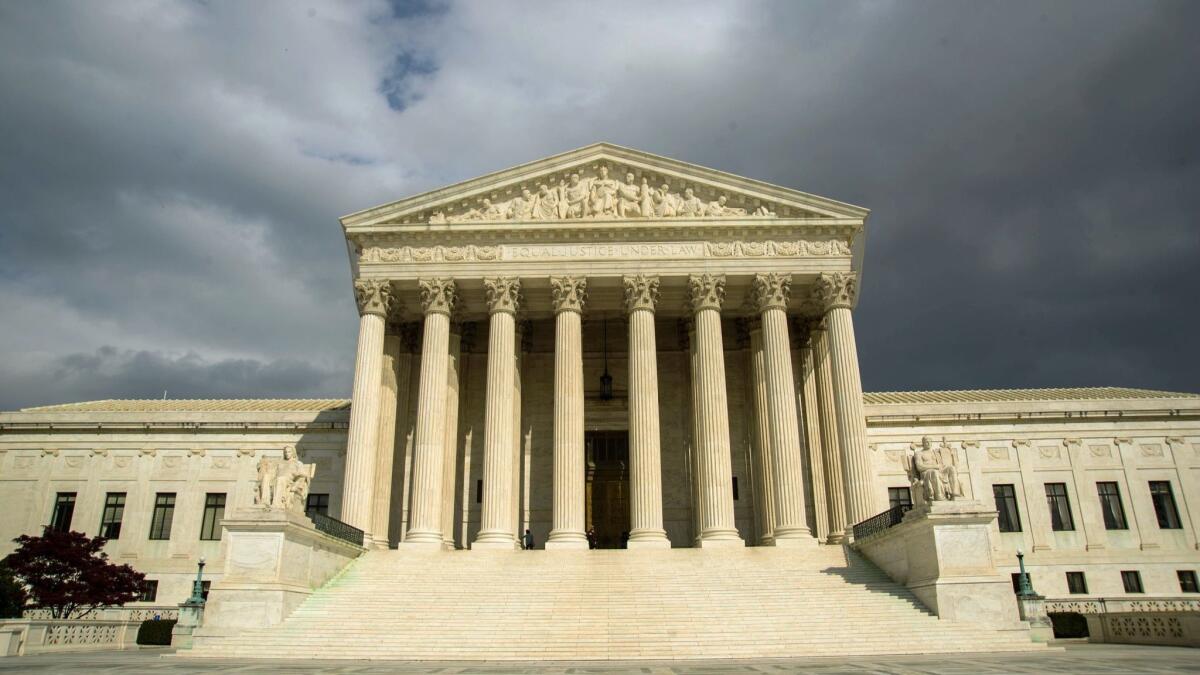Supreme Court signals Apple could stand trial in antitrust suit centered on App Store

- Share via
Reporting from Washington — The Supreme Court sounded open Monday to letting Apple stand trial in a civil suit alleging the maker of iPhones uses monopolistic power to unfairly profit from the sale of third-party apps offered on the devices.
The justices heard arguments in a potentially significant antitrust case that could determine whether other leading names in online shopping are also vulnerable to claims that they wield monopoly power in their market.
Lawyers for Apple, backed by the Trump administration, urged the justices to toss out a long-running antitrust claim filed in Northern California by several iPhone customers. The company relied heavily on a 1970s-era Supreme Court precedent that held that a manufacturer can be sued as a monopoly only by “direct purchasers” such as a wholesaler, not by a consumer who buys from a retailer.
But they ran into skeptical questions from the justices — both liberal and conservative — who said that rule seemed badly out of date at a time when online shoppers buy products from popular and dominant websites.
This “is a closed loop,” Justice Sonia Sotomayor told a lawyer for Apple. It is “dramatically different” from when a manufacturer sold to a wholesaler, who sold to a retailer, who in turn sold to the consumer. Then it was hard to figure who, if anyone, was paying an unfair price. By contrast, an iPhone customer who buys an app “is the first purchaser,” she said, and the cost includes a 30% commission to Apple.
Justice Stephen G. Breyer, who taught antitrust law before becoming a judge, said it looked to be a simple case of a monopoly because iPhone customers can buy apps only through Apple’s App Store.
At times during the hourlong argument, Justices Samuel A. Alito Jr., Neil M. Gorsuch and Brett M. Kavanaugh questioned the 1970s economic theory that blocked most antitrust suits against alleged price-fixing schemes that involved manufacturers and wholesalers.
U.S. Solicitor Gen. Noel Francisco, in support of Apple, said the court should hold the line and not permit antitrust suits to go forward based on a “pass through theory” that holds a dominant company liable for allegedly higher charges imposed by a retailer. In its brief, Apple said it operated like a shopping mall, where retailers set up a shop and sell to customers. Under this approach, Apple’s lawyers said, it is not fair to hold the company responsible for the prices charged by the retailer.
But Justices Elena Kagan and Kavanaugh took apart that theory. “When you look at the relationship between the consumer and Apple, there is only one step,” Kagan said. “I pick up my iPhone. I go to Apple’s App Store. I pay Apple directly with the credit card information that I’ve supplied to Apple. From my perspective, I’ve just engaged in a one-step transaction with Apple.”
Francisco disagreed. “Apple’s monopolistic over-charge is not the direct cause of higher prices,” he said “The direct cause of the higher prices is the app maker’s decision to increase their prices.”
“How do we know that,” Kavanaugh said, “given that Apple really operates as a retailer in many respects here, as Justice Kagan points out? How do we know that the 30% charge is not affecting the price?”
Kavanaugh also pointed to the words of the key antitrust law, which says “any person injured” may bring a claim. And the complaint in this case was brought on behalf of purchasers of apps who alleged they paid too much because of Apple’s control of the app store.
The outcome in Apple vs. Pepper is being closely watched because it could open the door to other anti-monopoly suits against platforms like Amazon.
The justices will not decide whether Apple must pay damages. At issue now is only whether the antitrust suit against Apple can proceed to further hearings and a trial on whether Apple wields monopoly power. If the high court rules against Apple early next year, the case would go back to a federal court in Oakland.
The suit began in 2011, and a federal judge ordered it dismissed on the grounds that purchasers of iPhone apps had no antitrust claim against Apple. But the 9th Circuit Court of Appeals, in a 3-0 opinion, revived the claim and allowed the suit to proceed on the theory that Apple acted as a distributor with monopoly power over the sale of its apps.
Much of corporate America has joined in support of Apple and argued that such broad antitrust claims should be blocked at the starting gate.
During Monday’s argument, only Chief Justice John G. Roberts Jr. argued for throwing out the claim. He has been steadily opposed to open-ended, class-action suits against corporations, and the Apple suit could ultimately have tens of millions of plaintiffs.
It will be several months before the justices hand down a ruling in the case.
More stories from David G. Savage »
Twitter: DavidGSavage
UPDATES:
2:15 p.m.: This article was updated with additional comments from the justices.
This article was originally published at 9:35 a.m.
More to Read
Get the L.A. Times Politics newsletter
Deeply reported insights into legislation, politics and policy from Sacramento, Washington and beyond. In your inbox twice per week.
You may occasionally receive promotional content from the Los Angeles Times.











